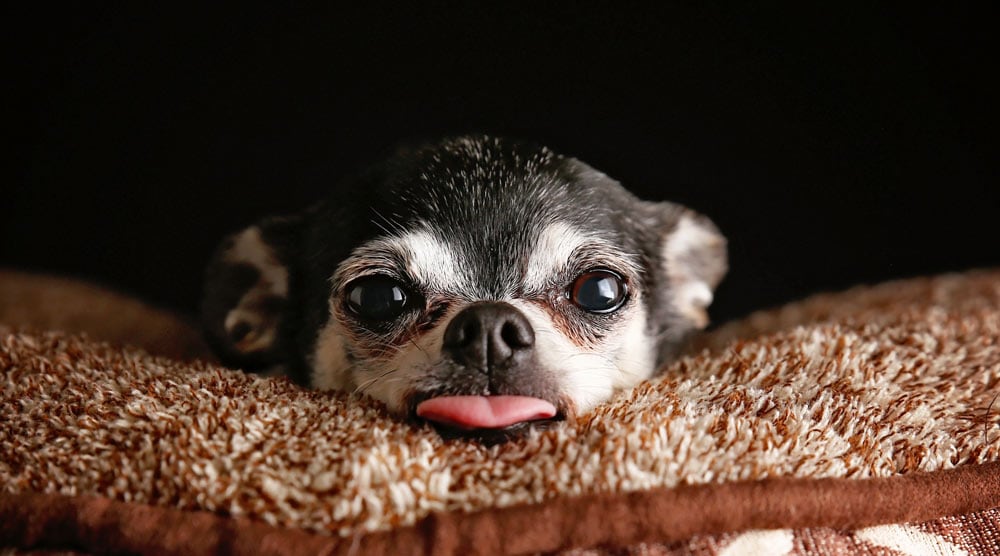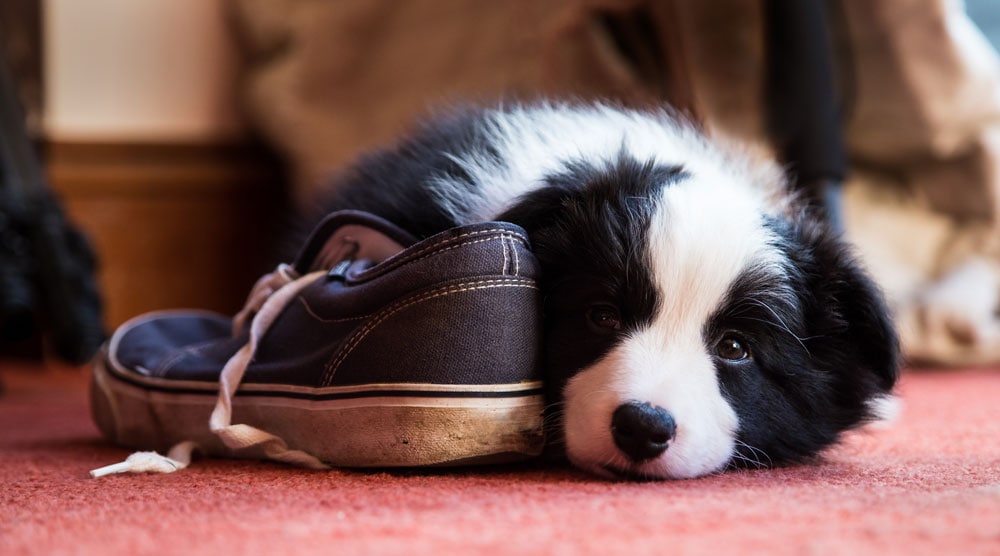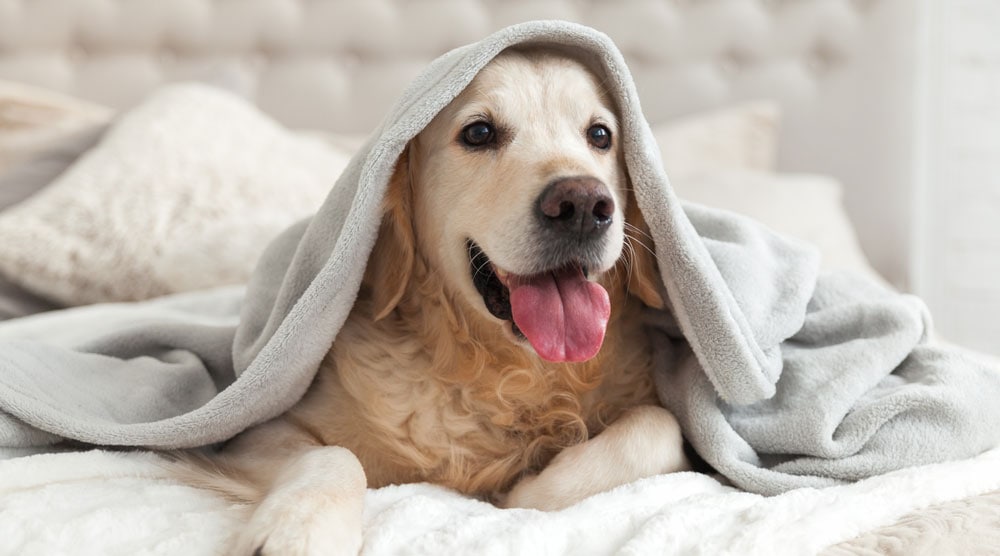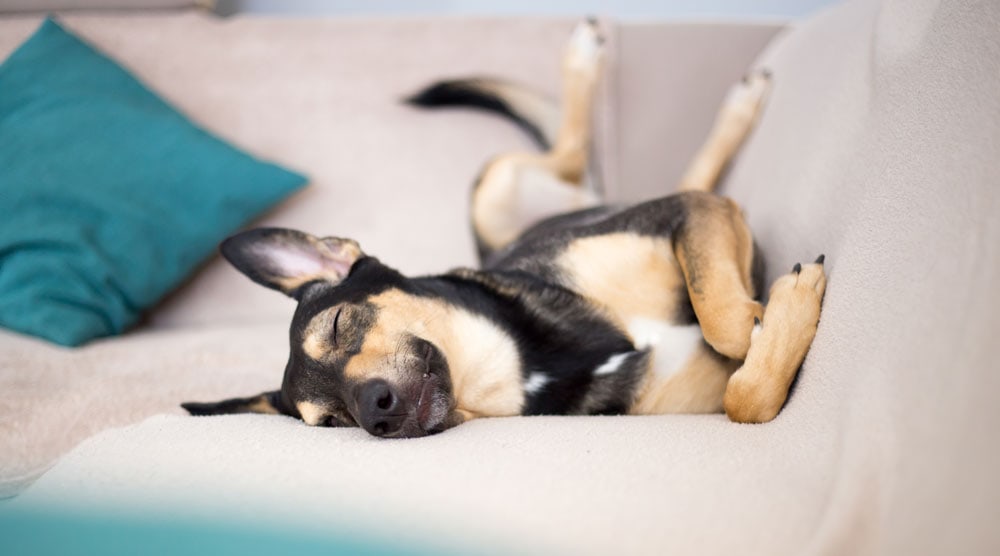Does your dog lick their bed? This might seem like strange behaviour, but it’s common for dogs to lick their bed or other objects.
While the occasional lick isn’t something to worry about, excessive or compulsive licking is more concerning.
For example, some dogs lick their beds due to anxiety or boredom. Bed licking can also be a way to soothe nausea or distract from mouth pain.
In this article, we’ll go through some of the main reasons dogs lick their beds and how to resolve them. We’ll also discuss when you should contact a vet or a canine behaviourist.
Contents
Why Do Dogs Lick Their Beds? (And How To Prevent It)

1. They Like The Taste
The most obvious reason a dog licks their bed is that they enjoy the taste!
Dogs have an excellent sense of smell, so they can easily find patches of old food, crumbs from a chew, or any other attractive scent.
Once a dog has found a scent, they’ll often lick it to examine it more closely. Dogs only have around 1700 taste buds compared to the 9000 in human mouths, so they might lick multiple times to get a proper taste.
Even if there’s no trace of food, the bed itself might have an intrinsic taste or interesting texture. This can cause the dog to lick the bed repeatedly, especially if they are bored or hungry.
You can’t stop a dog from licking attractive scents on their bed. But to reduce the chance of this behaviour, avoid feeding your dog on his bed and wash it regularly. Make sure you use mild or unscented laundry detergent, as a strong scent might encourage licking to make the bed smell familiar again.
2. Anxiety
Many people don’t realise that licking is a self-soothing behaviour for dogs. There are two main reasons for this:
- Licking releases brain hormones that make the dog feel good
- Licking can distract the dog from an anxiety trigger and reduce its intensity
So, a dog who is feeling anxious or stressed might lick their bed to gain a small amount of relief. They may also lick other objects (including sofas or floors), but the bed is often the most convenient option.
All dogs sometimes get anxious, so occasional bed licking probably isn’t something to worry about. But you shouldn’t ignore excessive, repeated, or ongoing licking due to anxiety.
This behaviour indicates that the dog is chronically stressed or unhappy, so it’s vital to understand what’s causing the anxiety and take steps to resolve it.
The first step to reducing anxiety in dogs is to work out what’s triggering the problem. Here are some questions that can help you uncover the trigger:
- Have there been recent changes in your dog’s home environment? These could range from major upheaval, such as moving house, to minor changes like moving their bed to a different location.
- Are there new members of the household (including babies and animals)?
- When does the licking tend to happen? Look for patterns, such as noises, guests, children playing, nearby objects, or time of day.
- Has your dog’s routine recently changed? Any change to a dog’s routine can cause increased anxiety and stress (this is usually temporary).
- Does your dog’s bed licking increase when you’re about to leave? This could be a sign of separation anxiety.
If you notice potential anxiety triggers, try to reduce their intensity and see whether this stops your dog’s bed licking.
3. Pain
Dogs sometimes lick their bed when they are in pain. As with anxiety, licking the bed can distract from the pain and release feel-good endorphins.
It can be hard to tell if a dog is in chronic pain, as canine instincts are to hide signs of weakness. Along with excessive licking, here are some other signs to watch out for:
- Shaking or trembling
- Panting
- Crying or whimpering
- Limping
- Inability to settle or rest
- Changes to personality, including not wanting to be touched or disinterested in play
- Noticeable stiffness after resting
- Licking a specific area of the body (along with objects)
- Reduced appetite
- Lip licking when touched
- Flinching or crying when touched
- Swelling around the affected area
It’s important to contact a vet if you suspect your dog is in pain.
4. Boredom or Frustration
When a dog is bored, they’ll look for a way to engage their mind and relieve frustration. Licking the bed is a common example, as it’s convenient and provides a small boost in endorphins.
The best way to prevent boredom is to make sure that your dog is getting enough physical exercise and mental stimulation. Aside from making your dog happier, preventing boredom makes it less likely that bed licking becomes a habit.
We’ve written in-depth guides to canine exercise and fun indoor activities for dogs, but here are some quick tips for preventing boredom in dogs:
- Ask your vet about how much exercise your dog needs each day. The amount of exercise varies depending on your dog’s age, breed, and health conditions.
- When on walks, make sure your dog has a chance to explore and sniff without rushing them. Sniffing is mentally stimulating and important for your pet’s well-being.
- Use a puzzle feeder for your dog’s meals. These force your dog to use their brain to access food, which is more fun and mentally tiring.
- Play indoor games, such as “find the toy” or tug-of-war.
- Make sure your dog gets plenty of attention throughout the day. Avoid leaving them alone for long periods.
5. Hunger
Bed licking can be a sign that your dog is hungry. Licking activates the saliva glands and taste buds, temporarily relieving hunger even if there’s no food on the bed.
Try to identify when your dog’s licking is most likely to happen. If they lick more as it gets close to mealtime, then hunger might be the cause. Check that you’re feeding enough food for their body weight and consider splitting up meals throughout the day.
6. Dehydration
Like with hunger, a dehydrated dog might lick their bed or another object. Licking triggers the production of saliva, which relieves some of the discomfort associated with dehydration.
Always provide access to fresh drinking water to prevent your dog from getting thirsty. Dehydration is a serious health problem that can lead to death, so continuous water is essential for your pet.
7. Acid Reflux
Acid reflux is when acid escapes from the stomach into the esophagus. A valve usually prevents acid from leaving the stomach, but some dogs have weakened valves that don’t work effectively.
When a dog has acid reflux, they’ll suffer from chronic pain in the throat. This can lead to a range of symptoms, such as:
- Lip licking
- Loss of appetite
- Coughing
- Pacing
- Restlessness (especially at night)
- Weight loss (if the condition is left untreated)
Dogs with acid reflux might also lick their bed. This behaviour can distract from the discomfort and cover up unpleasant tastes in the mouth.
8. Nausea Due to Gastrointestinal Problems
Nausea is one of the most common reasons a dog excessively licks an object, including their bed.
Licking distracts from unpleasant feelings and can temporarily reduce nausea. Nausea can also leave a bad taste in the mouth, which licking helps to cover up.
Nausea can be caused by a range of issues. For example, dietary allergies or eating a poisonous food can cause acute nausea. Chronic nausea can also be caused by conditions such as irritable bowel syndrome (IBS), pancreatitis, and parasites.
As there are many potential causes of this issue, you should always contact a vet if you suspect your dog is nauseous. Watch for other potential signs of a gastrointestinal issue, such as panting, lethargy, loss of appetite, lip licking, vomiting and drooling.
9. Gum Disease of Tooth Decay
Pain in the mouth can cause a dog to lick excessively as a distraction. This pain could be caused by various issues, such as gum disease, gingivitis, or tooth decay.
Similarly, an unusual feeling in the mouth can cause licking. For example, if a dog has chipped a tooth, then they might lick more often.
Always contact a vet if you think your dog might have pain in the mouth. Dental conditions can be extremely uncomfortable for a dog and greatly affect their quality of life.
10. Obsessive Behaviours
Sometimes bed licking becomes an obsessive-compulsive behaviour. In this situation, the dog will often intensely lick the bed with their full focus. You might also find it hard to distract them.
Compulsive behaviours are often triggered when a dog lacks mental stimulation for an extended time. For example, dogs caged or chained up for long periods often develop compulsive behaviour.
With that said, some dogs that receive plenty of attention and care also develop compulsive behaviours for unknown reasons.
Once bed licking has become an ingrained habit, it can be difficult to prevent it – even if you change the dog’s environment. You should discuss obsessive-compulsive behaviours with your vet and contact a dog behaviourist.
11. Canine Cognitive Dysfunction (Canine Dementia)
Many dogs suffer from canine cognitive dysfunction (CCD) as they age. This condition is similar to dementia in humans, and causes symptoms such as behaviour changes, sleeping more during the day, and confusion.
CCD can also lead to new obsessive behaviours, such as bed licking. So, if you notice bed licking and other symptoms of CCD, you should contact your vet. CCD can’t be cured, but the symptoms can often be managed with medication.
When Should You Contact a Vet About Bed Licking?
As a general rule, you should always get a vet checkup if you notice behaviour changes in your dog, including regularly licking the bed.
While you might assume that a dog licking the bed is a behavioural issue, it’s often triggered by a health problem. Gastrointestinal issues, mouth pain, or acid reflux can all cause excessive licking, so a vet check is always the first step.
This is particularly important if the bed licking continues for an extended time or if there are other symptoms. Any compulsive behaviours or worrying body language signals should also be investigated by a vet.
Once you’ve ruled out medical issues for bed licking, check that your dog isn’t bored, frustrated, hungry, or dehydrated. If these don’t appear to be the underlying cause, then you should contact a canine behaviourist.
What Could Cause a Senior Dog to Lick Their Bed?
Any of the potential causes of bed licking above could apply to a senior dog, but there are a few that are more likely.
For example, canine cognitive dysfunction is a common cause of compulsive behaviours in senior dogs. Gum disease and tooth decay are also more likely in older dogs.
You should always contact a vet if your senior dog develops new compulsive behaviours. These could be the first sign of a variety of medical conditions.
Summary
Dogs often lick their bed, so this isn’t always a reason to be concerned. The bed may just have an attractive taste, or the dog is distracting itself from mild anxiety.
You shouldn’t ignore ongoing or compulsive bed licking though. This behaviour could indicate a health issue, such as nausea, mouth pain, canine dementia, or acid reflux. Excessive licking could also signify a behavioural problem, including boredom, anxiety, or stress.
Do you have any questions about why dogs lick their beds? Please let us know using the comments form below. You may also want to read our guides on why dogs lick blankets and why dogs lick couches.



